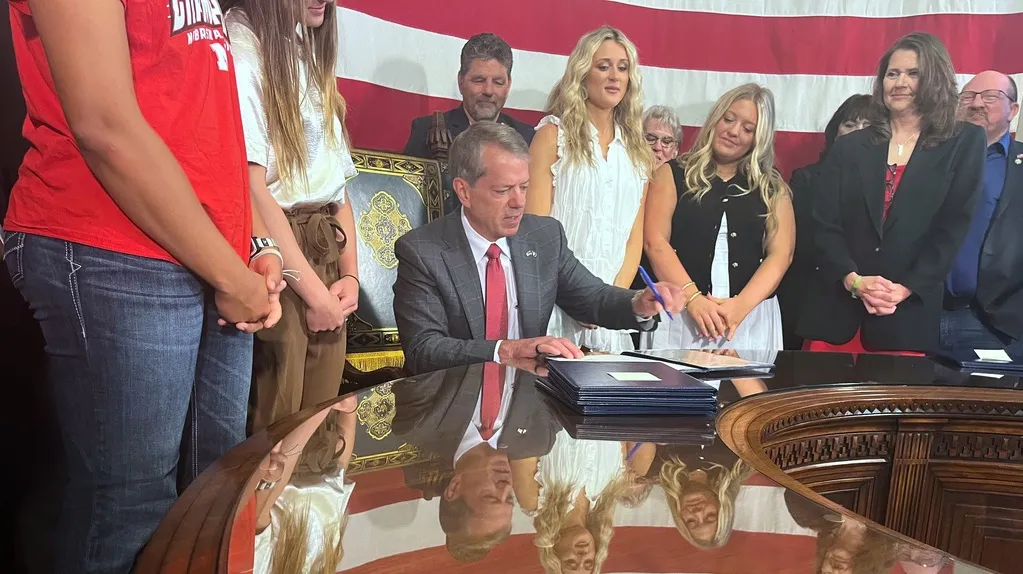December 27, 2012
New Laws Address Gay Rights, Children, Immigration
Jason St. Amand READ TIME: 4 MIN.
Measures on gay rights and child safety are among the top state laws taking effect at the start of 2013, along with attempts to prevent identity theft and perennial efforts to restrict abortion and illegal immigration.
In many states, new laws take effect on Jan. 1, while in others they do so 90 days after a governor's signature.
Voter-approved laws allowing same-sex couples to marry take effect in Maryland in January and in Maine on Saturday. California also approved a law exempting clergy members opposed to gay marriage from performing same-sex marriage ceremonies.
In California, a first-of-its-kind law bans a form of psychotherapy aimed at making gay teenagers straight but is on hold during a court challenge. The law would ban what is known as reparative or conversion therapy for minors; such therapies are widely discredited by medical professionals.
A number of laws seek to protect children from bullying and abuse. Pennsylvania school employees in contact with children, who already must report suspected abuse, must now be trained to recognize the warning signs, their legal obligations and what are considered appropriate relationships with children.
That law was being debated and voted on in June as a jury was finding former Penn State assistant football coach Jerry Sandusky guilty of 45 counts for sexually abusing 10 boys over 15 years.
California coaches and administrators in K-12 schools, as well as higher education employees who have regular contact with children, will be required to report suspected child sexual abuse. Oregon will require schools to adopt a policy on teen dating violence, a law that follows state legislation earlier this year requiring school employees to report acts of bullying, harassment and online bullying.
In Florida, the Safe Harbor Act includes provisions that require police to turn over to the Department of Children and Families any children who are alleged to be sexually exploited or dependent for assessment and possible shelter.
States continue to wrestle with illegal immigration. Pennsylvania will include a requirement that contractors on public works projects make sure through the federal E-Verify system that their employees are legal U.S. residents, while a Montana ballot measure taking effect denies illegal immigrants of state services.
Supporters say the Montana law will prevent illegal immigrants from obtaining services and prevent them from taking jobs at a time of high unemployment. Opponents argued there is no proof illegal immigrants are using state services in Montana.
Also in Montana, voters overwhelmingly passed a measure requiring parental notification for minors' abortions, while in Georgia a new law will prohibit doctors from performing an abortion 20 weeks after an egg is fertilized unless a pregnancy is determined to be medically futile, meaning it would result in the birth of a child unlikely to survive because of a serious defect. Georgia became the seventh state in the country to approve the so-called fetal pain act.
"Today, we are reaffirming Georgia's commitment to preserving the sanctity of all human life," Gov. Nathan Deal said in a statement released shortly after he signed the bill in May.
The measure passed over the objection of many female lawmakers, including Sen. Valencia Seay, who said the bill's passage and signing was "unconscionable, but not surprising" and typical of the male-dominated General Assembly.
New Hampshire enacts a ban on a type of late-term abortion procedure sometimes called "partial birth abortion" after lawmakers overrode the veto of Gov. John Lynch, who said the measure was unnecessary because federal law already prohibits such procedures. Supporters of the ban say they don't trust the government to prosecute the law.
In Maryland, parents will be able to freeze their child's credit at any time if the child becomes a victim of identity theft. "This just freezes the information to ensure that it's not used for ill purposes," said Delegate Craig Zucker, a Democrat who sponsored the bill in the Maryland House of Delegates.
In Delaware, state officials must request an annual credit report for every child in foster care.
Among other new laws:
- Alabama begins cracking down on the state's 900,000 uninsured drivers with a new system that allows instant checks by police, license plate offices and the state Revenue Department.
- A pair of laws in Georgia and Pennsylvania address the shortfalls faced by some states from the cost of unemployment benefits by raising employers' contributions to unemployment compensation trust funds.
- In New Mexico, drivers registering their car or truck will be able to donate $1 or $5 to a state fund that supports programs and services to veterans, such as assistance in finding a job or treatment of post-traumatic stress disorder. In Utah, U.S. military personnel will be exempted from having to pay a full year's property taxes after their return from 200 days of active duty in any calendar year.
- In Florida, it will no longer be illegal to flash your headlights to warn oncoming drivers that police are lurking on the roadside ahead. The legislation was introduced after drivers were ticketed for warning other motorists that officers may be trying to catch speeders on the highway.
- A California law bans the use of dogs when hunting bobcats or bears, while Wisconsin's expansion of its hunting seasons in state parks to a month in autumn and another in April was a scaled-back version of a proposal that would have allowed hunting across a seven-month period from mid-October to late May. Residents reacted to the longer proposal with thousands of angry letters and emails.
Most people who opposed the measure said they would stop bringing their families to state parks if there were a chance of being struck by a stray bullet or of a pet straying into an animal trap. Supporters countered that hunting has long been a Wisconsin tradition and that hunters were well-versed in practicing safe techniques.


